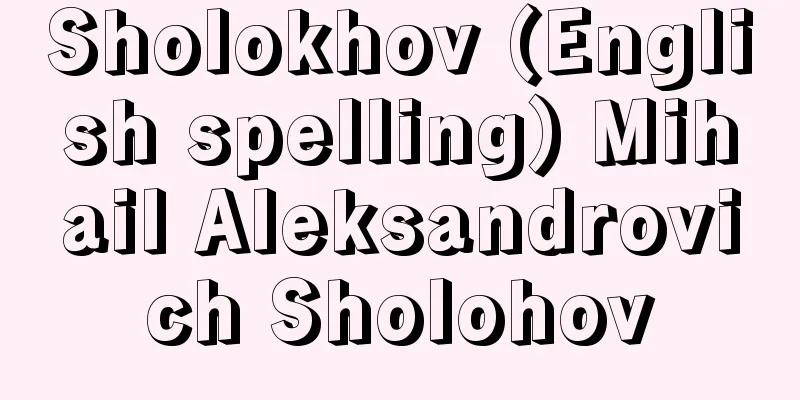Sholokhov (English spelling) Mihail Aleksandrovich Sholohov

|
Russian novelist. Born on May 24th in the village of Byoshenskaya on the Don River. His father worked in a store and only officially married his mother, who was a married woman, in 1912, so on paper he is listed as his mother's stepchild and adopted by his father, Sholokhov. In 1912 he entered primary school in the village, but soon went to Moscow and transferred to a private preparatory junior high school. After about three years there, he transferred to a junior high school in Boguchar, near his hometown, due to the outbreak of World War I. Eventually, with the October Revolution and the start of the Civil War, he abandoned his studies and returned to his father's home. The Don region was one of the main battlefields where the civil war was most fierce, and when the Soviet regime was established in 1920, Sholokhov, a 15-year-old boy, joined his village's revolutionary committee and took up arms to fight the counter-revolution, while also joining the Cossack movement to eliminate illiteracy, engaging in cultural enlightenment activities, and forming an amateur theater group to spread awareness of the significance of the revolution. There is no doubt that the historical events in which he not only witnessed but also risked his life to participate had a profound impact on his psyche from his childhood to early adolescence, and his literature was born from his questioning the meaning of these formative experiences and his attempt to express them in words. In 1922, Sholokhov went to Moscow, and while earning a living through hard labor, he devoted himself to his literary studies. He began writing short stories on the subject of the civil war in the Don region, and made his literary debut with the short story "The Mole" (1924). In two years, he wrote 25 short stories and one novella, and in 1926, he published two collections of works, "Tales of the Don" and "The Purple Wilderness." He was 21 years old at the time. This established his position as a budding writer, but he struggled to make a living. During that time, he married Maria Petrovna in 1924, and lost his father at the end of 1925. It was a difficult time both mentally and financially, but at the end of 1926, he settled in Byoshenskaya and devoted himself to writing a novel that depicted the fate of the Cossacks living in a turbulent era centered on the revolution on a grand scale. This is how he began writing "Quiet Don," which he completed in 1940 after more than a dozen years of work. While writing this work, he also wrote his second novel, Part 1 of The Virgin Land Opened (1932), which he completed in 1960 and was awarded the Lenin Prize for Literature at the same time. During World War II, he served as a war correspondent on the front lines, publishing reportage, and also writing the short story The Teachings of Hatred (1942) and the unfinished novel For Their Motherland (1943-44). After World War II, he published "The Fate of a Man" (1956), a novel about an old driver who loses his parents and siblings to famine in the midst of the revolution and civil war, and loses his wife and child in the German-Soviet War, but endures misfortune and lives a strong life, establishing his unshakable position in the Soviet literary world. During this time, he was elected a deputy to the Supreme Soviet of the Soviet Union in 1937, a member of the Academy of Sciences in 1939, and a member of the Central Committee of the Party in 1961. Sholokhov's works are widely read as classics of Soviet literature not only in Russia but also around the world, and he was awarded the Nobel Prize in Literature in 1965. He visited Japan in 1966 (Showa 41). He died on February 20, 1984. [Tadao Mizuno] "Hara Kyuichiro and Hara Takuya's translation of "World Literature Collection 13: The Story of Don" (1966, Shueisha)" ▽ "Yokota Mizuho's translation of "World Literature Collection 94: The Fate of Man" (1965, Chikuma Shobo)" [References] | |Source: Shogakukan Encyclopedia Nipponica About Encyclopedia Nipponica Information | Legend |
|
ロシアの小説家。5月24日、ドン川流域のビョーシェンスカヤ村に生まれる。父は商店に勤務する身で、人妻であった母と正式に結婚したのは1912年になってからで、そのため、戸籍上は母親の連れ子、父ショーロホフの養子となっている。12年、村の小学校に入学したが、まもなくモスクワに行き、私立の予備中学校に移り、約3年間を送ったあと、第一次世界大戦のため故郷の近くのボグチャル市の中学校に転校した。やがて十月革命、国内戦の開始とともに学業を放棄して父のもとに帰る。ドン地方は国内戦がもっとも激烈に展開された主戦場の一つであったが、20年にソビエト政権が樹立されると、15歳の少年であったショーロホフも村の革命委員会に所属し、武器を持って反革命と戦い、かたわらコサックの非識字者解消運動に加わり、文化的な啓蒙(けいもう)活動を行い、アマチュア劇団を結成して革命の意義を宣伝した。単なる目撃者としてのみならず、自らの生命を賭(と)して参加した歴史の事件が、少年期から青春前期にかけての彼の精神に深刻な影響を残したことは疑いなく、この原体験の意味を問い、それをことばで表現せんとしたところから、彼の文学は生まれた。 1922年、ショーロホフはモスクワに出て、重労働の仕事で生活の糧(かて)を得ながら文学修業に励み、ドン地方の内戦を主題とする短編を書き始め、短編『ほくろ』(1924)で文壇にデビューし、2年間で25の短編と中編1編を書き、26年に、『ドン物語』『るり色の曠野(こうや)』の2冊の作品集を刊行した。21歳のときである。これで新進作家としての地位を確立したが、生活は苦しかった。その間、24年にマリヤ・ペトローブナと結婚し、25年末には父親を失っている。精神的にも物質的にも困難な時期であったが、26年末からビョーシェンスカヤに居を定め、革命を中心とする激動する時代に生きるコサックの運命を雄大なスケールのもとに描き出そうとする長編の執筆に専念した。こうして書き始められたのが『静かなドン』で、十数年の歳月を費やして、40年に完結した。この作品を書き進めながら、第二の長編『開かれた処女地』第1部(1932)を書き上げ、60年に完成、それと同時にレーニン文学賞を受賞。このほか、第二次世界大戦中には従軍記者として前線に赴き、ルポルタージュを発表、また短編『憎しみの教え』(1942)、未完の長編『彼ら祖国のために』(1943~44)を書いた。 第二次世界大戦後は、革命と国内戦のさなかで飢饉(ききん)のために親や兄弟を失い、独ソ戦で妻子と死別しながらも、不幸に耐え、力強く生き抜いた老運転手を主人公とする『人間の運命』(1956)を発表し、ソビエト文学界に揺るぎない地位を確立した。この間、1937年にソ連邦最高会議代議員、39年に科学アカデミー会員、61年に党中央委員に選出されている。ショーロホフの作品は国内だけではなく、世界各国でソ連文学の古典として広く読まれ、65年にノーベル文学賞を授与された。66年(昭和41)来日。84年2月20日没。 [水野忠夫] 『原久一郎・原卓也訳『世界文学全集13 ドン物語』(1966・集英社)』▽『横田瑞穂訳『世界文学大系94 人間の運命』(1965・筑摩書房)』 [参照項目] | |出典 小学館 日本大百科全書(ニッポニカ)日本大百科全書(ニッポニカ)について 情報 | 凡例 |
>>: Llorona (English spelling)
Recommend
Duty of Notification
This refers to the obligation of the policyholder...
Soga no Iname
Year of death: 31.3.1 (570.3.22) Year of birth: Ye...
Persian literature
In a broad sense, it refers to literature written...
Pezophaps solitaria (English spelling)
...Later, at the end of the 16th century, the Dut...
Graal
…It is a legend strongly influenced by Christiani...
Czechoslovakia incident - Czechoslovakia incident
On August 20, 1968, the armies of five countries, ...
Amihari [Hot Spring] - Amihari
This hot spring is located at the southern foot of...
Hibiscus
A general term for the genus Hibiscus in the Malv...
Lippi, Fra Filippo
Born: 1406. Florence [Died] October 8/10, 1469. Sp...
Buoy - Fuhyo (English spelling)
Also called a buoy. A structure that floats on or ...
delivery of breech presentation
...If the fetus is small, there is no need to wor...
Hillel
[Born] Around 70 B.C. A Jewish rabbi born in Babyl...
Harnoncourt, N.
…An early music group using period instruments. F...
Cima da Conegliano (English spelling)
...On the other hand, the tradition of portrait p...
Kozu Ranch
This mountain ranch is located in the southwest o...









